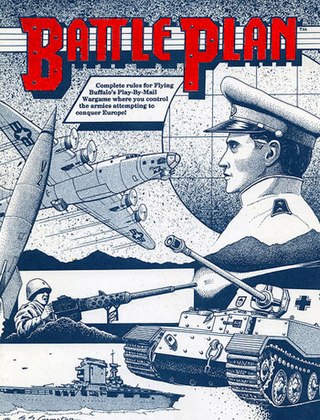Related Research Articles

A play-by-mail game is a game played through postal mail, email, or other digital media. Correspondence chess and Go were among the first PBM games. Diplomacy has been played by mail since 1963, introducing a multi-player aspect to PBM games. Flying Buffalo Inc. pioneered the first commercially available PBM game in 1970. A small number of PBM companies followed in the 1970s, with an explosion of hundreds of startup PBM companies in the 1980s at the peak of PBM gaming popularity, many of them small hobby companies—more than 90 percent of which eventually folded. A number of independent PBM magazines also started in the 1980s, including The Nuts & Bolts of PBM, Gaming Universal, Paper Mayhem and Flagship. These magazines eventually went out of print, replaced in the 21st century by the online PBM journal Suspense and Decision.

Flying Buffalo Inc. (FBI) is a game company with a line of role playing games, card games, and other gaming materials. The company's founder, Rick Loomis, began game publishing with Nuclear Destruction, a play-by-mail game which started the professional PBM industry in the United States. Loomis added games and players while introducing computer moderation and soon incorporated into the company Flying Buffalo Inc. The company published games in other genres, including card games such as Nuclear War and a role playing game called Tunnels & Trolls, a game similar to Dungeons & Dragons. Flying Buffalo acquired its 10,000th customer account number in 1980 and reached its largest size of 21 employees in 1983.
Starweb is a closed-end, space-based, play-by-mail (PBM) game. First published by Flying Buffalo Inc. in 1975, it was the company's second PBM game after Nuclear Destruction, the game that started the PBM industry in 1970. Players today can choose a postal mail or email format. Fifteen players per game assume one of six available roles and explore and conquer planets within a universe comprising 225 worlds. The object of the game is to attain a predetermined number of points which are generated by various actions during gameplay. Multiple game variants are available. Starweb is still available for play as of 2021 through the company Rick Loomis PBM Games.

Legends is a turn-based, role-playing game with a medieval setting. It is currently published in English by Harlequin Games. Jim Landes—owner of Midnight Games, the game's first publisher—began developing the game in 1984, eventually publishing it in December 1989 as a play-by-mail (PBM) game after over a year of playtesting. The initial game comprised a module and game system built on the publisher's existing game, Epic, and was run briefly as Swords of Pelarn before publication as Legends. The first of multiple game modules was Crown of Avalon, which allowed up to 200 players per game. Demand by 1991 was "incredible" according to Bruce R. Daniel in White Wolf. Games could be lengthy, initially between three and ten years of play, settling into an average of three years by 2002.
Alamaze is a computer-moderated, fantasy, turn-based game. It was published in 1986 by Pegasus Productions as a play-by-mail game. Reality Simulations later took over game moderation. The game itself has been played with multiple versions. The initial design, released in 1986, was replaced by the "Second Cycle" in 1991, offering changes to the kingdoms and game's history. The 3rd Cycle—"The Choosing"—emerged in 2015, doubling the available kingdoms while providing modifications to them. The publisher made additional changes to the player–game interface by 2017. In February 2019, Alamaze.co published the 4th Cycle, the world of Maelstrom, after two years of development. The game is currently run by Alamaze.co as a closed-end, play-by-email (PBEM) game in a turn-based format.

Heroic Fantasy is a computer-moderated, dungeon crawl play-by-mail game. It has been active since 1982 when it was published by Flying Buffalo. The initial edition involved nine dungeon levels. Flying Buffalo published subsequent editions due to challenging gameplay initially, eventually limiting the game to four dungeon levels with a fifth outdoors level where players can assemble an army and capture one or more castles. The game is open-ended; gameplay continues until players decide to stop.

Hyborian War is a play-by-mail game published by Reality Simulations, Inc. It takes place during the Hyborian Age in the world of Conan the Barbarian created by Robert E. Howard. The game has been continuously available for worldwide play since its inception in 1985 and has changed little in its overall format. It uses a computer program to adjudicate player orders. Although it relies on postal mail or email and has turnaround times which are relatively long for the digital age of video games, Hyborian War has remained active into the 21st century.
Warp Force Empires is a play-by-mail game that was published by Emprise Game Systems. The game was previously called Warp Force One, but renamed in 1984 by its publisher.
Midgard is an open-end, medieval fantasy play-by-mail game. It was published in 1984 by Time Space Simulations. Through 1996, the game passed through more than four different publishers, including Midgard USA. As of 2022, Talisman Games is the publisher. At initial publication, Midgard was computer moderated with partial human moderation.
CTF 2187 is a closed-end, computer-moderated, play-by-mail (PBM) game that was published by Advanced Gaming Enterprises in the 1980s. It involved teams of robots, of varying size and capabilities, battling on a hex-grid arena with the purpose of defeating the opposing team or their command post. Players assumed the role of a battle robot pilot. The game was tactically-focused, with combat action beginning on the first turn. Games lasted 5–10 turns, or about six months. Players began at the rank of cadet but could spend experience points earned from a completed game to increase in rank for future games, up to the rank of General.
It's a Crime is a play-by-mail (PBM) game initially published by Adventures By Mail in September 1985. On publication, it was an introductory PBM game that took place in New York City in the 1990s where players attempted to raise a gang leader to the position of Godfather. During its initial decade, gameplay was technically simple at the outset, but added additional possible turn orders if players progressed to higher levels such as "mob boss". The coordination and diplomacy among players added additional complexity to the game. The game won the Origins Award in 1986 for the Best New Play-By-Mail Game of 1986 and a second Origins Award for Best Play-by-Mail Game of 1989.
Lords of the Earth (LOTE) is a play-by-email game, first published by Thomas Harlan in 1983 during a growing era of PBM games. Initially played by postal mail, the game featured mixed moderation—computer moderated with some human assistance. By 2002, the publisher processed turns by email (PBeM). Lords of the Earth comprises multiple campaigns, each one a separate game. Campaign 1 is the oldest, set in the mid-1800s in the "Age of Air and Steam". Other campaigns begin from 2000 BCE to 1400 CE. Settings were global in scale, with one campaign featuring an outer space setting.

Battle Plan is a closed-end, military strategy, play-by-mail (PBM) wargame. It was first published by Flying Buffalo Inc. in 1972, as one of the company's game offerings after Nuclear Destruction, the game that started the PBM industry in 1970. In August 2021, Rick Loomis PBM Games began publishing the game.

Victory! The Battle for Europe is a closed-end, military strategy, play-by-mail (PBM) wargame. The game was first published by Rolling Thunder Games, Inc. in 1991 after a period of initial growth in the PBM industry. The game centers on Europe while including parts of North Africa, the Middle East, the United States, and Canada. Forty players start each game with equal resources among countries, although geography causes differences between starting positions. Games last for about three years each. The game received positive reviews and rankings in the PBM magazine Paper Mayhem in the 1990s, including tying for second place in its Best PBM Game of 1995 list.

Quest is an open-end, fantasy, play-by-mail (PBM) role-playing game. Initially released in the United Kingdom in 1991, by Adventures by Mail, it later became available for play in the United States, Australia, and other countries in Europe. The game has a First and Second Age, initially comprising about twenty worlds of up to 1,000 parties controlled by players. After the year 2000, the worlds consolidated into four. The current publisher is KJC Games.
Epic is a computer-moderated, fantasy play-by-mail (PBM) game.
State of War is a closed-end, computer-moderated, play-by-mail (PBM) wargame. It was published by Game Systems, Inc.
Venom is a closed-end, computer-moderated, play-by-mail (PBM) wargame. It was published by Game Systems, Inc. in 1989. Twenty players role-played demigods battling for supremacyby developing their position and winning a final battle. Demigod characters were highly customizable in the manner of spaceships for space-based PBM games. The game received generally poor reviews before the publisher revised the game in 1990 which improved the game according to one reviewer.
Eclipse is a computer moderated, space-based play-by-mail (PBM) game. It was published by Midnight Games. 12–20 players per game vied for domination of a galaxy on a game map comprising 180–220 star systems.
References
- 1 2 3 4 5 Townsend, Jim (March–April 1988). "Domination!". Paper Mayhem. No. 29. pp. 6–7.
- ↑ "PBM Game Ratings". Paper Mayhem . No. 36. May–June 1989. p. 3.
- 1 2 3 4 Golden, Kelly (November–December 1990). "PBM Review: Domination". White Wolf Magazine . No. 18. p. 58.
- ↑ Piediscalzzi, Terry (January–February 1989). "The A,B,...Zs of Economics for Domination". Paper Mayhem . No. 34. p. 35.